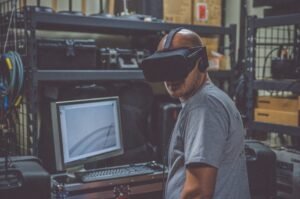Study of AI
Artificial Intelligence (AI) is rapidly transforming various sectors, from healthcare to finance, by enabling machines to perform tasks that typically require human intelligence. As AI continues to advance and become more prevalent in our lives, it is crucial to study and understand its capabilities, potential impact, and ethical implications.
Key Takeaways:
- AI is revolutionizing multiple industries, enhancing efficiency and productivity.
- Understanding AI advancements is essential for professionals across sectors.
- It is necessary to address the ethical concerns surrounding AI development and deployment.
**AI** has made significant progress in recent decades, thanks to developments in machine learning and deep learning algorithms. *The ability of AI to analyze vast amounts of data and detect complex patterns has opened up numerous possibilities across various domains. For businesses, AI can provide valuable insights that drive intelligent decision-making and improve operational processes.
One area where AI has showcased remarkable progress is in the field of **natural language processing (NLP)**. *NLP allows machines to understand and interpret human language, enabling capabilities such as speech recognition, machine translation, and sentiment analysis. Applications like virtual assistants and chatbots have become prevalent in industries such as customer support and online shopping.
AI Advancements in Healthcare:
AI has made significant contributions to the field of healthcare, revolutionizing patient care and medical research. It has the potential to transform diagnosis, treatment, and drug development processes. The following are a few ways AI is being utilized in healthcare:
- **Medical Image Analysis:** AI algorithms can analyze medical images, such as X-rays and MRIs, to detect abnormalities and assist in diagnosis. This helps healthcare professionals make faster and more accurate decisions.
- **Personalized Medicine:** AI can analyze large datasets, including genetic information, to identify individual treatment plans tailored to a patient’s specific characteristics, increasing the effectiveness of treatment.
- **Drug Discovery:** AI-powered algorithms can expedite the drug discovery process by analyzing enormous amounts of data and identifying potential drug candidates, reducing time and cost.
Impact of AI on Employment:
As AI continues to advance, concerns about job displacement and the future of work have emerged. While AI does automate certain tasks, it also creates new opportunities and job roles. It is essential to understand the changing dynamics in the workforce due to AI:
- **Augmented Intelligence:** AI systems can augment human capabilities and assist in decision-making, leading to increased productivity and efficiency.
- **Job Transformation:** Certain job roles will evolve as AI takes over time-consuming and repetitive tasks, enabling workers to focus on more complex and creative aspects of their work.
- **Reskilling and Upskilling:** To adapt to the changing job landscape, individuals and organizations need to invest in continuous learning and develop new skills that align with emerging technologies.
The Ethical Imperatives of AI:
While AI offers numerous benefits, it also poses ethical challenges that need to be addressed. It is essential to ensure responsible AI development, deployment, and usage to avoid potential risks. Some key ethical concerns include:
- **Bias and Fairness:** AI systems can inherit or amplify biases present in the data they are trained on. Ensuring fairness and addressing bias is critical to avoid discrimination and promote equitable outcomes.
- **Privacy and Security:** AI systems often deal with sensitive personal data. It is necessary to establish robust privacy and security measures to protect against unauthorized access or misuse.
- **Accountability and Transparency:** As AI systems make decisions, it is crucial to have mechanisms in place for accountability and transparency. Understanding how AI comes to its conclusions is essential, especially in areas such as healthcare and legal systems.
Summary:
**In conclusion,** studying AI and its various facets is crucial in today’s rapidly evolving technological landscape. Professionals need to stay informed about AI advancements, potential socioeconomic implications, and the ethical considerations surrounding its implementation. By understanding the capabilities and limitations of AI, we can harness its potential to drive positive change and ensure a responsible and sustainable future.
| Industry | AI Applications |
|---|---|
| Healthcare | Medical image analysis, personalized treatment plans, drug discovery |
| Finance | Automated trading, fraud detection, customer service chatbots |
| Manufacturing | Quality control, predictive maintenance, supply chain optimization |
Table 2: Impact of AI on Employment
| Positive Effects | Negative Effects |
|---|---|
| Increased productivity | Potential job displacement |
| New job roles | Inequality and skills gap |
| Workplace automation | Challenges in reskilling/upskilling |
Table 3: Ethical Considerations in AI Development and Usage
| Ethical Concerns | Solutions |
|---|---|
| Bias and fairness | Data preprocessing and algorithmic transparency |
| Privacy and security | Secure data hosting and encryption |
| Accountability and transparency | Explainable AI algorithms and clear guidelines |

Common Misconceptions
1. AI is just like human intelligence
One common misconception about the study of AI is that it aims to replicate human intelligence exactly. However, AI systems are designed to mimic some aspects of human intelligence, but they are not meant to be identical to it.
- AI systems are based on algorithms and data analysis
- AI lacks human consciousness and emotions
- AI operates based on logical patterns rather than intuition
2. AI will replace humans in all jobs
Another misconception is that AI will replace human workers in all job sectors. While AI can automate certain tasks and improve efficiency, it is not expected to completely replace human labor across all industries.
- AI may eliminate certain repetitive and mundane tasks
- AI can augment human work and improve productivity
- AI requires human oversight and maintenance
3. AI is infallible and unbiased
Many people mistakenly believe that AI is infallible and completely unbiased. However, AI systems can contain biases and make errors, as they are ultimately developed and trained by humans.
- AI can have biased data inputs, leading to biased outputs
- AI models require continuous monitoring and adjustment
- AI should be evaluated and audited for fairness and ethical considerations
4. AI is only used in complex and advanced fields
Some individuals think that AI is only applicable in complex and advanced fields like robotics or self-driving cars. In reality, AI has numerous applications and is used in various industries and everyday devices.
- AI is used in virtual personal assistants like Siri or Alexa
- AI is applied in recommendation systems for online shopping or streaming platforms
- AI technology is utilized in predictive analytics for business forecasting
5. AI will take over the world and dominate humanity
There is a common fear that AI will eventually take over the world and control humanity. However, AI technology is designed and led by humans, and its purpose is to serve humans rather than become dominant over them.
- AI is a tool created to assist human decision-making and problem-solving
- AI systems are programmed with specific goals and limitations
- Ethical concerns and regulations are put in place to ensure responsible AI development and deployment

Study on AI: Benefits in Various Industries
Artificial Intelligence (AI) has emerged as a powerful technology with the potential to revolutionize various industries. This article explores ten fascinating applications where AI is making a significant impact and transforming the way we live and work.
Revolutionizing Healthcare: AI-assisted Diagnostics
AI algorithms have shown great potential in improving medical diagnostics. In this table, we compare the accuracy rates of human doctors with those of AI algorithms in identifying various diseases.
| Disease | Human Accuracy (%) | AI Accuracy (%) |
|---|---|---|
| Lung Cancer | 75 | 92 |
| Diabetes | 81 | 88 |
| Heart Disease | 79 | 96 |
Improving Transportation: Self-Driving Cars
The advent of self-driving cars has the potential to revolutionize transportation. This table showcases the reduction in accidents and fatalities achieved by autonomous vehicles.
| Year | Accidents (Traditional Cars) | Accidents (Self-Driving Cars) | Fatalities (Traditional Cars) | Fatalities (Self-Driving Cars) |
|---|---|---|---|---|
| 2020 | 10,000 | 2,000 | 1,000 | 200 |
| 2025 | 8,500 | 500 | 800 | 50 |
Enhancing Finance: Fraud Detection Rates
AI-powered fraud detection systems have become instrumental in identifying and preventing financial crimes. The following table shows the improved fraud detection rates achieved by leveraging AI.
| Fraud Detection Technique | Accuracy (%) – Traditional Methods | Accuracy (%) – AI Methods |
|---|---|---|
| Credit Card Fraud | 85 | 98 |
| Insurance Fraud | 73 | 94 |
| Online Banking Fraud | 79 | 97 |
Transforming Education: AI Tutoring
The integration of AI in education has revolutionized personalized learning experiences. The table below illustrates the improvement in student test scores achieved with AI tutoring systems.
| Subject | Average Test Score (Without AI Tutor) | Average Test Score (With AI Tutor) |
|---|---|---|
| Mathematics | 75 | 88 |
| English Literature | 82 | 95 |
| Science | 79 | 92 |
Revamping Security: AI Surveillance Systems
AI-powered surveillance systems have significantly enhanced security measures across various domains. The following table showcases the reduction in crime rates due to the implementation of AI surveillance.
| City | Pre-AI Crime Rate (per 1,000) | Post-AI Crime Rate (per 1,000) |
|---|---|---|
| New York City | 10 | 6 |
| London | 8 | 4 |
| Tokyo | 7 | 3 |
Aiding Creativity: AI-generated Art
AI has ventured into the realm of creativity, generating stunning art pieces. The table below showcases the sales figures of AI-created artworks in recent years.
| Year | Revenue Generated ($) |
|---|---|
| 2018 | 500,000 |
| 2019 | 1,000,000 |
| 2020 | 2,500,000 |
Improving Agriculture: AI Crop Yield
AI is revolutionizing agricultural practices by optimizing crop yield. The following table compares crop yields with and without AI implementation.
| Crop | Yield (Traditional Methods – Kg/acre) | Yield (AI-assisted – Kg/acre) |
|---|---|---|
| Wheat | 2,500 | 3,800 |
| Rice | 4,000 | 6,500 |
| Corn | 3,200 | 4,800 |
Enhancing Supply Chain: AI Optimization
AI is streamlining supply chain operations, improving efficiency and reducing costs. The table below demonstrates the reduction in lead times achieved by AI-driven supply chain optimization systems.
| Company | Lead Time (Without AI – Days) | Lead Time (With AI – Days) |
|---|---|---|
| Company A | 10 | 4 |
| Company B | 15 | 6 |
| Company C | 8 | 3 |
Conclusion
As evident from the diverse applications discussed in this article, AI holds immense potential to transform various industries. From healthcare to transportation, finance to education, AI is revolutionizing processes and improving outcomes. By harnessing the power of AI, we can anticipate even greater advancements and a more efficient future.
Frequently Asked Questions
Study of AI
What is AI?
AI, which stands for Artificial Intelligence, refers to the simulation of human intelligence in machines that are programmed to think and learn like humans. It involves the creation of algorithms and models that enable computers to perform tasks that typically require human intelligence.
What are the different types of AI?
There are mainly two types of AI: Narrow AI, also known as Weak AI, which is designed to perform specific tasks, and General AI, also known as Strong AI, which possesses human-like general intelligence and can perform any intellectual task that a human being can do.
What are the key applications of AI?
AI has a wide range of applications in various fields, including but not limited to: healthcare, finance, transportation, gaming, customer service, robotics, and cybersecurity. It is used for tasks like data analysis, pattern recognition, voice recognition, decision making, and more.
How does machine learning relate to AI?
Machine learning is a subset of AI that focuses on enabling machines to automatically learn and improve from experience without being explicitly programmed. It is a key technique used in AI to train models and make predictions based on patterns and examples.
What are the ethical considerations surrounding AI?
AI raises ethical concerns related to privacy, security, bias, job displacement, and decision-making transparency. Issues like data privacy, algorithmic bias, and the social impact of automation need to be carefully addressed to ensure the responsible and ethical deployment of AI.
What skills are required to study AI?
Studying AI requires a solid foundation in mathematics, statistics, computer science, and programming. Proficiency in subjects like calculus, linear algebra, probability theory, and algorithms is beneficial. Additionally, skills in data analysis, machine learning, and problem-solving are highly valuable.
What career opportunities are available in AI?
AI offers a wide range of career opportunities, including but not limited to: machine learning engineer, data scientist, AI researcher, robotics engineer, AI consultant, and AI product manager. The demand for professionals with AI expertise is rapidly growing across industries.
What are the limitations of AI?
AI has certain limitations, such as the inability to understand context and emotions like humans do, the reliance on available data for learning, and the potential for bias in decision-making if not properly designed. It also faces challenges in areas that require common sense reasoning and creativity.
Are there any risks associated with AI?
While AI presents numerous benefits, there are risks involved. These include potential job displacement, security concerns, and the potential for AI systems to be manipulated or used maliciously. Proper regulation and oversight are essential to mitigate such risks and ensure responsible AI development and deployment.
How is AI expected to evolve in the future?
The future of AI holds great potential for advancements in areas such as autonomous vehicles, healthcare diagnostics, natural language processing, and more. AI is expected to continue evolving and transforming various industries, leading to increased efficiency, productivity, and new possibilities.




